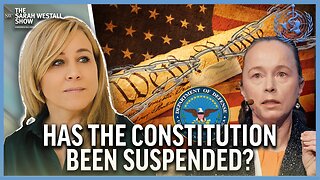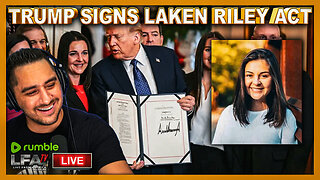Premium Only Content

Morality Beyond Faith: Can You Be Good Without Religion?
#MoralityWithoutMyth
#SecularSaints
#DivineOrDivided
#NoReligionNoProblem
#MoralGPS
#AtheistAndAwesome
#HolyHypocrisy
#ConscienceOverCommandments #BuffetOfMorals
#MoralAnarchyClub #nyc #new #newvideo #SassySecularism
#TenCommandmentsWho?
#GoodWithoutGod
#UniversalEthics #morality
#MoralDilemmasAndDonuts
the age-old question: Do you need religion to be a moral person? Let's dive into this with a healthy dose of sarcasm and humor, shall we?
Do You Need Religion to Be a Moral Person?
Picture this: You're standing at the gates of morality, and there's a bouncer. This bouncer isn't checking IDs or dress codes; he's checking for religious affiliation. "Sorry, buddy, no religion, no entry," he says, as you stand there, clutching your secular humanism pamphlet.
But wait! Is that really how it works? Do we need a divine hall pass to be decent human beings? Let's explore this with the subtlety of a sledgehammer.
The Divine Rulebook
First off, let's talk about the divine rulebook. Many religions come with a handy set of guidelines, like the Ten Commandments or the Five Pillars. It's like a moral GPS, recalculating your route every time you stray. But here's the kicker: Do you really need a celestial GPS to tell you not to steal your neighbor's Wi-Fi or to return that extra dollar the cashier gave you by mistake?
Imagine a world where people only refrained from murder because a holy book told them so. "I'd totally rob this bank, but the Good Book says no," said no morally sound person ever. Most of us have this thing called a conscience, which, surprise surprise, doesn't always need a religious upgrade to function.
The Atheist Conundrum
Now, let's address the elephant in the room: atheists. According to some, atheists are like moral anarchists, running wild without the leash of divine oversight. But if that were true, wouldn't atheists be the ones causing all the chaos? Last I checked, the majority of atheists aren't plotting world domination or stealing candy from babies. In fact, many are busy doing things like donating to charity, volunteering, and generally being decent folks¹.
The Universal Morality
Here's a fun fact: Morality isn't exclusive to religious folks. Studies have shown that principles like fairness, loyalty, and kindness are pretty universal¹. It's almost as if humans, regardless of their belief system, have an innate sense of right and wrong. Shocking, I know.
Think about it: If morality were solely the domain of the religious, we'd have a lot more trouble on our hands. Imagine trying to explain to your dog that chewing your shoes is wrong because it's against the Ten Commandments. Spoiler alert: The dog doesn't care. Morality, much like a good sense of humor, transcends religious boundaries.
The Hypocrisy Factor
Let's not forget the delightful hypocrisy that sometimes accompanies religious morality. Ever heard of the phrase "Do as I say, not as I do"? Some of the most morally questionable actions in history have been justified by religious beliefs. Crusades, anyone? Witch hunts? It's almost as if humans can twist any belief system to suit their less-than-noble purposes.
The Bottom Line
So, do you need religion to be a moral person? Not really. Religion can certainly provide a framework for morality, but it's not the only blueprint out there. Morality is more like a buffet than a fixed menu. You can pick and choose from various sources—religion, philosophy, personal experience—and still end up with a well-balanced moral diet.
In the end, being a moral person is less about where you get your rules from and more about how you apply them. Whether you're guided by a holy book, a philosophical text, or just a gut feeling, what matters is that you strive to be a decent human being. And if you need a little sarcasm and humor to get through the moral maze, well, that's just the cherry on top.
-
 1:08:47
1:08:47
Man in America
14 hours agoDr. Makis EXPOSES Big Pharma’s SICK Vaccine Scam—RFK Jr. Must Act NOW!
96.1K24 -
 1:28:21
1:28:21
Glenn Greenwald
12 hours agoRFK Jr. Hearing Reveals DC Pro-Pharma Consensus; Trump's Executive Order to Deport Student Protesters Criticizing Israel; Untangling DC Think Tank Funding & Influence | SYSTEM UPDATE #399
142K165 -
 1:23:44
1:23:44
Space Ice
13 hours agoSpace Ice & Redeye: Van Damme's The Quest: Pirates, Clowns, James Bond & Bloodsport
47.1K3 -
 59:57
59:57
The StoneZONE with Roger Stone
10 hours agoJ6 Martyr Enrique Tarrio Describes Inhumane Prison Conditions Ordered by Biden | The StoneZONE
44.5K4 -
 16:48
16:48
Tundra Tactical
10 hours ago $8.05 earnedAffordable Medical Gear From ACETAC SHOT Show 2025
74.3K3 -
 1:46:16
1:46:16
Redacted News
13 hours agoRFK CONFIRMATION: Kennedy goes to WAR with Big Pharma Democrats in Fiery Hearing | Redacted Live
257K428 -
 57:31
57:31
Candace Show Podcast
13 hours agoBREAKING! Taylor Swift Turns Against Blake Lively & Ryan Reynolds | Candace Ep 141
235K187 -
 1:04:59
1:04:59
Sarah Westall
10 hours agoRFK Jr Report, Constitution Suspended, War Time Procedures in Place, WHO Exit, DOD w/ Sasha Latypova
77.2K35 -
 1:56:37
1:56:37
Melonie Mac
14 hours agoGo Boom Live Ep 35!
67K15 -
 1:01:13
1:01:13
LFA TV
17 hours agoPRESIDENT TRUMP SIGNS LAKEN RILEY ACT | BASED AMERICA 1.29.25 6pm
72.5K8